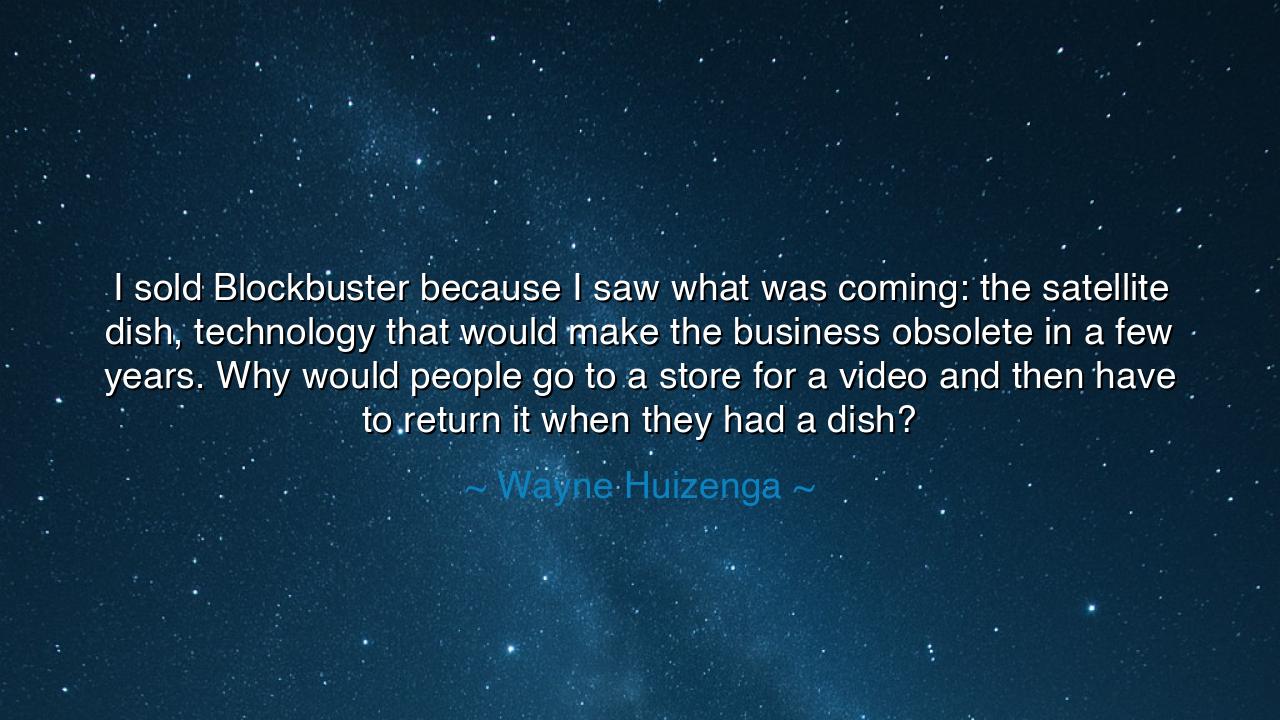
I sold Blockbuster because I saw what was coming: the satellite
I sold Blockbuster because I saw what was coming: the satellite dish, technology that would make the business obsolete in a few years. Why would people go to a store for a video and then have to return it when they had a dish?






Hearken to the words of Wayne Huizenga, the builder and the seller, who declared: “I sold Blockbuster because I saw what was coming: the satellite dish, technology that would make the business obsolete in a few years. Why would people go to a store for a video and then have to return it when they had a dish?” This is not the speech of chance, but the voice of foresight. It is the wisdom of one who gazed beyond the horizon, who saw that every empire, no matter how mighty, must one day bend before the tide of technology. To cling blindly is to perish, but to release, to move forward, is to live again.
Huizenga speaks to us of the ephemeral nature of power and success. Blockbuster was no small kingdom—it was vast, with its banners spread across cities, its vaults of tapes a treasure trove for millions. To many, it seemed eternal, a fortress against time. Yet Huizenga, like the ancient seers, discerned the shifting winds. He saw in the humble satellite dish the seed of destruction for an empire built on tapes and late fees. He did not curse the change, nor deny it. He chose instead to act, to yield, to move with the river rather than against it. In this, he revealed not cowardice, but great courage.
Reflect on the tale of Kodak, once the master of memories. For nearly a century, it reigned supreme in the art of film. Yet when digital photography emerged, Kodak clung to its golden age, refusing to embrace the new. The result was ruin: the giant crumbled while others who seized the rising tide—Canon, Sony, later even Apple—rose to greatness. Contrast this with Huizenga, who, like a seasoned captain, abandoned the ship before the storm split it apart. He read the signs of time and made his choice not out of fear, but out of understanding.
The lesson hidden within this tale is one of foresight and humility. Many celebrate strength, but few honor adaptability. To see change is one thing; to embrace it is another. Huizenga reminds us that wisdom lies not in defending the old for its own sake, but in recognizing when the old has served its purpose and when the new must be welcomed. He understood that people would not forever journey to a store when the heavens themselves could rain movies upon their homes. To ignore this truth would have been folly. To act upon it was genius.
There is also within this teaching a reminder of impermanence. Do not fall in love with structures, for they crumble. Do not idolize systems, for they are replaced. Do not chain yourself to methods, for they become dust. Instead, anchor yourself in vision, in the ability to perceive the path ahead. For though tools change, and markets shift, the eternal strength lies in the eye that sees and the hand that adapts. Huizenga’s glory was not that he built Blockbuster, but that he knew when to let Blockbuster go.
O seeker of wisdom, take this to heart: in your own life, you too will build castles—habits, careers, dreams—that may one day become obsolete. Do not mourn their passing, but be ready to shape new ones. Study the world around you. Ask: What is coming? What storm gathers on the horizon? What invention, what idea, will reshape my field, my craft, my destiny? To ignore these questions is to be swept away; to ask them is to prepare yourself for the future.
Practical action must follow this wisdom. Watch closely the movements of technology, of culture, of thought. Do not resist them blindly, nor embrace them rashly, but study them with patience. Be willing to release what no longer serves, even if once it made you strong. Practice this even in small things—let go of old routines that hinder growth, of outdated tools that waste time, of beliefs that chain your spirit. In these small renunciations, you prepare yourself for the greater ones that destiny will demand.
So let the words of Huizenga echo in your soul: pride is not in what you hold, but in what you see before others do. Be not the one who clings until the ruin comes, but the one who acts before the ruin arrives. For history honors not merely the builders, but the visionaries who can also walk away—those who know that endings are the beginning of new creations.






AAdministratorAdministrator
Welcome, honored guests. Please leave a comment, we will respond soon